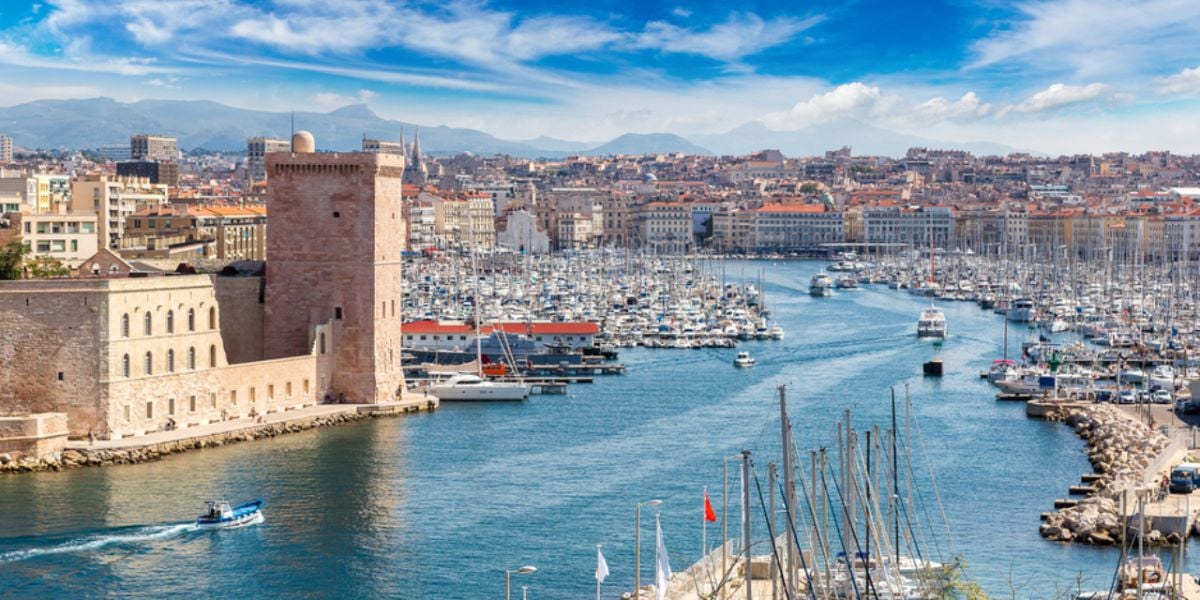
Also known as the "cité phocéenne", Marseille is France's second-largest city and the capital of Provence. Known for its multicultural population, sunny climate, and proximity to the sea, Marseille continues to attract expatriates and vacationers alike. These characteristics provide abundant career opportunities for expatriates seeking to work in Marseille.
Marseille's economy
With a population exceeding 870,000, Marseille is renowned for its dynamism, warmth, and hospitality. The city has experienced significant economic growth in recent years, driven largely by the service sector, tourism, culture, and its port — France's leading Mediterranean port and the largest in the country. In terms of employment, Marseille is highlighted as the most dynamic area in the Provence-Alpes–Côte d'Azur region. According to the 2023 report from the Institut national de la statistique et des études économiques (INSEE), tourism alone generated 145,000 jobs in the region (data from 2019 as per the 2023 report).
The Port of Marseille ranks among the largest in the Mediterranean and plays a vital role in global trade and maritime transport. Facilitating trade greatly boosts the city's economic activity. Marseille has also witnessed increasing growth in the technology and innovation sector, which has been marked by the rise of startups and tech firms in biotechnology, digital health, and creative industries. Additionally, being a coastal city, Marseille enjoys a robust presence in the boating, fishing, and maritime sectors.
Sectors recruiting in Marseille
As the local economy is mainly driven by the tertiary sector, you're more likely to find a job in Marseille in the following areas, provided you have the required qualifications and skills:
- personal services;
- business services;
- community services;
- hotels and catering;
- tourism.
While the service sector is crucial, candidates can also explore opportunities in human resources, management, logistics, and even engineering.
Marseille hosts numerous companies and multinational corporations that are open to hiring expatriates. These include McDonald's, SNCF, EDF, La Poste, O2, Haribo, Ricard, Apave, Egencia, and Wiko. However, don't hesitate to apply to small and medium-sized enterprises (SMEs) throughout the city as well. Below, we've listed some of them for your consideration.
The most important companies in Marseille
Marseille hosts a multitude of small and medium-sized enterprises across diverse industries, actively hiring new staff each year. These companies offer job opportunities ranging from fixed-term and permanent contracts to internships and apprenticeships for students. Below is a selection of some of the city's prominent SMEs:
- Pernod-Ricard: Pernod-Ricard is a quintessential Marseille brand. Established in 1932, its iconic alcoholic beverage, "Ricard", is deeply rooted in the heritage of southern France. Distributed across France and globally, Pernod Ricard Group employs 19,480 people worldwide. Known for its strong cultural ties to the Marseille region, the company fosters a culture of conviviality and employee satisfaction, making it a highly desirable workplace;
- Wiko: Wiko, a Chinese brand, established its headquarters in Marseille in 2011. Specializing in cell phones and telecommunications, the company operates in over 30 countries while maintaining its distinctive start-up culture. Wiko frequently hires dynamic and motivated individuals, seeking unconventional personalities as indicated in its website's "careers" section;
- Le Petit Marseillais: Le Petit Marseillais, renowned for its soaps, shower gels, and shampoos, embodies the vibrant spirit of Marseille. Acquired by Johnson & Johnson in 2006, the brand has achieved global acclaim and is committed to environmental stewardship by using sustainably sourced ingredients in its products. The company frequently advertises job openings for project managers, product managers, and internships. However, the soaps of the "Le Petit Marseillais" brand are not produced in Marseille but in Normandy, located in north-western France. Acquired by the American group Johnson & Johnson in 2006, the brand effectively capitalized on the Marseille and Provence image to establish itself in the market. Marseille historically was one of France's prominent soap producers, but its industry declined with the advent of synthetic products in the 1950s. In recent years, there has been renewed interest in Marseille soap due to increasing environmental awareness and preference for natural products. However, it's essential to be cautious of imitations, as the term "Marseille soap" lacks protection, allowing any manufacturer to use it for their products. Genuine artisanal Marseille soap can still be found in Marseille. Today, there are four traditional soap manufacturers in Marseille: Savonnerie de la Licorne, Savonnerie du Midi, Savonnerie Le Sérail, and Savonnerie Le Fer à Cheval;
- CMA CGM: CMA CGM, a prominent player in the French economy, specializes in container shipping. As the largest private employer in Marseille, its headquarters employs 2,400 people. The shipping industry provides diverse career opportunities, with a growing demand for skilled professionals in roles such as senior cloud managers, project managers, network architects, executive assistants, business analysts, area sales representatives, and various internships.
How do I find a job in Marseille?
In France, job seekers can sign up with France Travail (formerly Pôle emploi) for personalized job search assistance and training support. This public agency handles employment matters and is accessible to foreigners as well. Multiple offices are located in Marseille. Additionally, individuals who experience job loss due to redundancy or contract expiration must contact France Travail to apply for unemployment benefits. Expatriates, including those from non-European Union (EU) or European Economic Area (EEA) countries, can also approach them. However, they will need specific documentation like a residence permit and/or visa to register with France Travail. You may be asked for the following documents when you register with France Travail:
- temporary or multi-annual residence permit (from 1 to 10 years) for "private and family life", "employee", "seeking employment or setting up a business", or "temporary worker";
- multiannual residence permit with "talent passport" status;
- carte de résident (issued for 10 years), marked "résident", "résident permanent" or "résident longue durée – UE";
- residence permit for "foreign students or trainees", marked "seeking employment or setting up a business";
- long-stay visa issued for 4 to 12 months, with "employee", "private and family life", or "job-seeking or business start-up" written on the visa;
- temporary work permit, in the case of an employment contract terminated early by the employer;
- Algerian residency certificate, marked "vie privée et familiale", "salarié", "scientifique", "professions artistiques et culturelles" or "travailleurs temporaires".
If you are from an EU or EEA member state, you simply need to present your valid identity card. Please check the France Travail page dedicated to foreigners.
Good to know:
France Travail offers a wide range of job listings. While you can browse them without registering, some offers are exclusively accessible to registered users of France Travail.
For your job search, you can also register with Marseille's Maison de l'emploi, which acts as a facilitator between employers and job seekers in the city.
There is no shortage of temporary employment agencies in Marseille. Don't hesitate to register on their websites or contact them directly. Among the most notable agencies in the city are Adecco, Mistertemp, and RAS Interim.
Get a head start by beginning your job search on the internet before you relocate abroad. Networking, as discussed later in the article, will also be beneficial if you have friends and contacts in the area who can inform you about job opportunities in your field. Don't forget to consult professional social networks such as LinkedIn, one of the best for finding a job and easily connecting with professionals and companies, but also Facebook and its page dedicated to employment and online forums, where you'll find temporary and long-term jobs.
Lastly, we recommend actively sending speculative applications and following up with companies that interest you. These practices are widely used in France and are effective for making yourself known and remembered. Customize your CV and cover letter for each application to show genuine interest in the company and distinguish yourself from other applicants.
Finding a student job in Marseille
If you've decided to continue your studies or start a course of study in Marseille, you should know that it's possible to find a student job. Even foreign students can work in France, provided they have a long-stay student visa from a non-EU or EEA country. You'll be able to work 20 hours a week or 964 hours a year. For more information on the long-stay student visa, please consult the Campus France page on the subject.
Our first tip for students seeking work in Marseille is to contact your university directly. Universities often receive job offers specifically for students, which are posted on platforms like the student intranet or notice boards around campus.
Word-of-mouth is another effective method for finding a student job. Don't hesitate to chat with your new friends on campus or your roommates if you have any. You can also seek their advice and insights into the local job market to avoid potential pitfalls and surprises.
France Travail makes it easy to search for student vacancies via its search engine. Alternatively, there are many student job sites, such as Student Job, Erasmusu, or l'Étudiant, where you can also get sound advice.
If you speak multiple foreign languages, consider offering private language lessons, which are in high demand among students and younger individuals. It's an excellent opportunity to blend work with cultural exchanges with French speakers.
Networking in Marseille
Professional networking is both a useful and recognized practice in France, so don't miss the chance to do it yourself! For starters, you can take part in networking events organized in Marseille, which often take the form of relaxed get-togethers over drinks, aperitifs, evenings, or even breakfasts and lunches. These events are often organized by associations, private organizations, or companies looking for new talent. To find them in Marseille, the reference sites for this type of meeting are, of course, Eventbrite and Meetup. Anyone can take part; entry fees are affordable. In some cases, it's even free.
If you're fluent in English, consider reaching out to English-speaking organizations to connect with professionals. Additionally, regularly check Facebook groups and pages dedicated to job offers for foreigners.
Lastly, like students, utilize word-of-mouth! It's one of the most effective methods for job seekers in France, including Marseille. Networking and connecting with the right people can greatly influence your job search in such a large city. You'll find that many are willing to help, even those you didn't expect. Discuss career opportunities with new acquaintances, and you may uncover opportunities you hadn't previously considered, potentially leading to an interview with your ideal company!
Setting up your own business in Marseille
Working doesn't necessarily mean being employed by a company. There are plenty of budding entrepreneurs in France, and even foreigners can find something to set up in Marseille. All you need is the right residence permit to set up your own business, a good knowledge of the job market and the economy in your sector of activity, and all the formalities, such as the different legal statuses that exist for setting up a business.
One crucial step in establishing your company is finding commercial premises or an office where you can accommodate your new employees and clients unless you operate independently from home.
Marseille offers a wide variety of premises available for rent or sale, catering to various needs and budgets. It's essential to assess your requirements based on the space you need and your financial limits. Another option worth considering is coworking spaces. These shared environments are appealing to young, dynamic entrepreneurs who enjoy collaborating with other talented individuals. In recent years, coworking spaces have gained popularity in France, especially in Marseille. We have found a few addresses:
- Regus, Marseille les Docks, 10, place de la Joliette;
- Now Coworking Marseille, 10, quai de Rive Neuve;
- Le Bureau – Coworking in Marseille, 73, rue Sylvabelle;
- Center Atlas Coworking, 24, avenue du Prado;
- Le Loft Coworking, 36, rue Sainte;
- Smack Coworking, 24, rue Lulli.
This list is not comprehensive; Marseille offers a wide range of coworking spaces across all its districts. Prices depend on the chosen space and duration of use.
Work and wages in Marseille
Does working in Marseille make you happy? One might assume so. Numerous articles praise the benefits of living in the south of France: sunshine, stunning landscapes, the sea... Marseille appears to have it all. However, this overlooks the impact of the economic crisis, which is affecting workers' spending power.
You might be curious about the earnings in Marseille. According to INSEE, the average net wage in Marseille is 15.6 euros per hour (figures from 2021 published in February 2024). However, earnings vary significantly across different socio-professional categories (PCS). Executives, professionals in intellectual roles, and entrepreneurs earn higher wages at around 25.9 euros per hour, which is 10 euros more than the average. Employees and blue-collar workers earn below the average at 11.5 euros and 11.6 euros per hour, respectively. Regarding gender pay equity, progress is noticeable primarily among white-collar workers, where women earn "barely" 1.3% less than men. In other categories, the disparity is higher, with women earning 11.9% less on average. Specifically in Marseille, women in managerial and intermediate positions earn approximately 15% less than their male counterparts, while female blue-collar workers earn 14.5% less than their male counterparts.
Nevertheless, there has been a clear improvement: the wage gap between women and men has narrowed for 18- to 25 year-olds (–8.6%) and 26- to 50 year-olds (–9.3%). However, it remains extremely high for the over-50s (–16.9%).
Are younger generations benefiting from a more supportive professional environment? The growing emphasis on mental health and well-being in workplaces suggests so. As you begin your job search in Marseille, these considerations may weigh heavily on your mind, as the workplace constitutes a significant part of life. Many companies are now prioritizing employee well-being, highlighting factors such as work atmosphere and organizational culture as crucial aspects to consider in your job search.
Useful links :
We do our best to provide accurate and up to date information. However, if you have noticed any inaccuracies in this article, please let us know in the comments section below.








